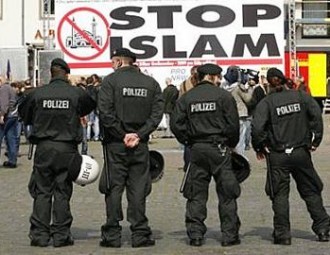Uladzimir Matskevich: Attacks in Europe are made by the same forces that perceive Islam as a foe

Europe is unlikely to reject the multicultural doctrine, even though it will have to review a number of issues related to the naturalization of migrants.
What consequences will the EU face after terroristic attacks in France? What will be the European answer to the actions of Islamic radicals? Can the French tragedy be repeated in Belarus? Uladzimir Matskevich, the head of the Board of the International Consortium “EuroBelarus”, answers the questions of “EuroBelarus” Information Service.
- Attacks in France shocked the whole world. What challenges did the events in France set before the civilized countries?
- Terrorism is quite spread in the modern world and most attacks are somehow related to the events in the Middle East. But many attacks also have to do with the reaction to caricatures towards Islam, which proves that we are dealing with the confrontation of two different approaches to the development of modern civilization. Even though caricatures are an author’s way to interpret political events, some Muslims treat them as attacks on Islam, speaking on behalf of all Muslims without any right to do so.
Islam is different from the Catholic or Orthodox Christian Churches in the hierarchy, as there is no clear one. And that is why every Muslim believes that he has a right to speak on behalf of all Muslims. And this is why the reaction of the society to the situation in France is inadequate: attacks were made by concrete people, while the religion bears responsibility for the attack.
- What consequences will the attacks in France have?
- It never happened so that an attack led to the results that the terrorists expected.
Instead of punishing those guilty of offending the religious feelings with caricatures, they punish innocent people. Instead of informing the society about their point of view, they discredit Islam and all values for which they kill innocent people. Attacks only reinforce the intensity of hatred and confrontation.
Attacks cause large damage to the Muslim diaspora in Europe.
- What reaction to attacks will follow from Europe?
- There are many speculations about it: the Right call for toughening of migration politics and control over migrants. Some lobbyists will be continuing this course further, but it will hardly be successful.
Europe has a clear concept of migration politics: it cultivates doctrine of multiculturalism. I don’t think that Europe will give it up, though it will have to review some defects of naturalization and integration of migrants to the national communities.
France might have to learn the experience of Sweden and Denmark, even though there are no countries that have ideal relations between migrants and major nation.
France has long ago been having problems with naturalization and migration. However, the inertness of politics and slowness of the EU administration didn’t allow France react to these signals.
- Is there a threat that French attacks are repeated in Belarus?
- Belarusan doctrine remains the same and is aimed at preventing any kind of extremism; all they are under total control of intelligent services.
If we consider social and psychological adaptation of migrants in Belarus, this policy has no difference from the European. The state is good with fiscal functions; however, real adaptation of migrants is no better than the European system, though, of course, there are much fewer migrants in Belarus than in Europe. Even if the Belarusan regime appeals to the French tragedy, it’ll only happen in order to strengthen intelligent services and increase their funding.
- I.e. the repeat of the French tragedy is left out, isn’t it?
- No one can feel fully safe in no place on Earth. In April 2011 there was an explosion in Minsk metro. Stricken planes, exploded towers in New York, murders of politicians are a world practice.
But different civilization approaches give different opportunities to react on attacks. Politically mature societies can allow bear arms for self-defense. Some states strengthen intelligent services and control over migrants. This variant is chosen by the authoritarian regimes as well.
-
03.01
-
07.10
-
22.09
-
17.08
-
12.08
-
30.09








































